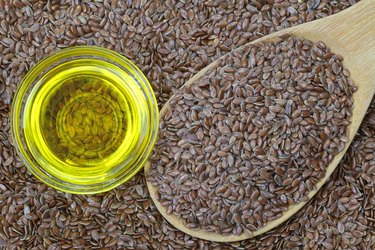
There are many ways to extract oils from plants. However, cold pressed oil is unique — it's environmentally friendly and doesn't require heat or chemicals when made. You can create many commonly consumed oils, including soybean, hemp, flaxseed, olive and corn oils, using cold press extraction.
Tip
Cold pressed oil is made using a machine known as an oil press. The oil extraction process must occur at a temperature of 49 degrees Celsius (120 degrees Fahrenheit) or lower.
Video of the Day
Video of the Day
What Is Cold Pressed Oil?
Cold pressed oil is made using a method known as cold press extraction. The cold press oil extraction method is done using an oilseed press, like many other oils. However, it's unique because it involves no additional chemical solvents or heat.
In fact, the Penn State University Extension says cold pressed oil extraction specifically requires the entire process to occur at 49 C (120 F) or less. Given the strict temperature requirement, cold pressed oil extraction is a fairly slow process. Any oil that is produced using an oilseed press that doesn't meet this strict temperature requirement is usually known as pressed or expeller pressed oil.
However, other countries have different requirements for their cold pressed oils. For example, the British Association of Cold Pressed Oil Producers (BACPOP) says cold pressed oils that adhere to their standards are produced at 40 C (104 F) or lower. If you buy imported olive oils or other products, be aware that these oils may be cold pressed at slightly different temperatures.
Common cold pressed oils include:
- Coconut oil
- Soybean oil
- Sunflower oil
- Rapeseed oil
- Corn oil
- Grapeseed oil
- Hemp oil
- Rice bran oil
- Olive oil
- Pumpkin seed oil
- Borage oil
- Strawberry seed oil
- Hazlenut oil
- Pistachio oil
- Walnut oil
- Apricot oil
- Cashew oil
- Flaxseed oil
- Peanut oil (also known as groundnut oil)
- Almond oil
- Pecan oil
Unfortunately, not all oils can be produced through cold pressed extraction. The moisture content of a nut or seed can affect whether or not oil can be produced with this method. For example, Brazil nuts and tomato seeds both have a high moisture content. These and other plants with high moisture contents require more heat for the oil to be extracted properly.
Read more: 9 Delicious Recipes Made With Healthy Fats
Benefits of Cold Pressed Oil
According to the Penn State University Extension and a December 2018 study in the Ukrainian Food Journal, oil produced using the cold pressed extraction method is thought to be more environmentally friendly compared to oil made with other methods. This is primarily because it doesn't involve any additional chemicals. Chemicals are typically used to improve the total quantity of oil that can be extracted from a plant.
Cold pressed oil is also thought to have increased nutritional and health benefits. These oils are typically rich in vitamin E and monounsaturated and polyunsaturated fatty acids.
A May 2014 study in the Journal of the American Oil Chemical Society reported that certain cold pressed oils can have an increased amount of antioxidants. BACPOP also states that cold pressed oil has a better shelf life than other oils, which means that it's less likely to go rancid.
However, these benefits don't mean that cold pressed oil is necessarily the healthiest cooking oil. Whether or not your cold pressed oil is the healthiest cooking oil depends on the plant it came from and other processing factors.
What you intend to use the oil for is also a major determining factor. Cold pressed oils can almost always be used to make salad dressings and dips. However, the smoke point of certain oils may be affected by the cold press extraction process.
According to the Mayo Clinic, you should only cook with oils that have a medium or high smoke point. If you cook with oils that have a low smoke point, your oil is likely to start smoking (which means it's burning and losing its nutritional value).
- Journal of the American Oil Chemical Society: "The Antioxidant Activity and Oxidative Stability of Cold-Pressed Oils"
- Penn State University Extension: "Oilseed Presses"
- Ukrainian Food Journal: "Cold Press in Oil Extraction. A Review"
- National Edible Oil Distributors Association: "BACPOP (British Association of Cold Pressed Oil Producers)"
- Mayo Clinic: "Which Type of Oil Should I Use for Cooking With High Heat?"
- Spectrum Organics: Expeller Pressed vs. Cold Pressed